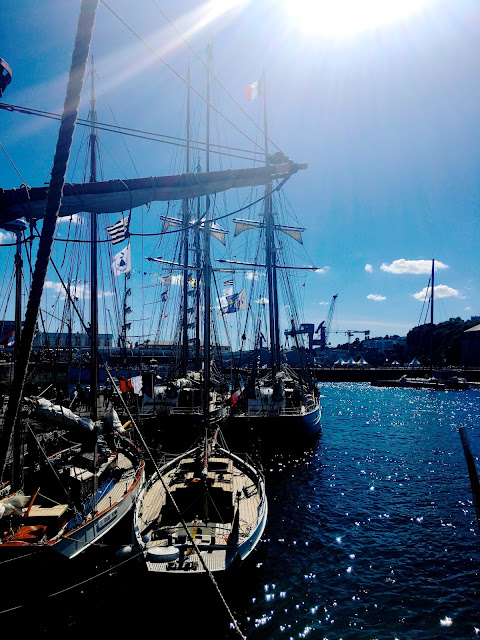The drive out to Finistère is long and panoramic, the landscape ranging from undulating heaths awash with blossoms, to ravaged, sinister cliffs. It is the toughest, fiercest, and most isolated part of the region, making concessions to no one and nothing but the sea. Out here, the dangers of the waters and the treacherous black reefs are infamous, as are the stories of its remote coastal towns, dominated by grim, black-garbed, white-coiffed women whose husbands and sons spent as a many as seven consecutive years at sea. For centuries, Finistère has been a place of howling winter winds, mythic legends, and shipwrecks, a place where a shroud of fog wraps the coast for more than forty days a year. This morning though, the air is clear, cold, and refreshing, and the sun irradiates the shoreline as we finally pull into the quiet and seemingly forgotten town of Brignogan-Plages.
I am here with my good friend, Mélanie, who was raised in Finistère. We have been friends ever since she first came to Rhodes as a teaching assistant, and it is surreal to be here with her in the place where she grew up. As we walk through its narrow ruelles, or tiny streets, every house is covered by masses of hydrangeas and vines, each roof thickly thatched to protect from the inescapable elements of the coast.
Only a few scattered people are out on the white beach, and the rocky cape is painted with seaweed and silken flowers. Even Mélanie says there is a gripping loneliness out here that, for many, is very difficult, especially during the winter months. As we look out to the sea, there is but a distant sailboat that marks the end of continental Europe.
Mélanie's grandmother has stayed in Brignogan all her life and lives only two houses away from the one in which she was born. In her garden, wild raspberries are growing, and we pick them for our last leg down to Brest. We drive with the windows down, listening to the one radio station available, and the car is filled with wind and the whistle of Gaelic flutes.
Mélanie says that growing up here, she remembers watching the cows and playing barefoot with neighbors. She mentions that in such a small place, everyone knows everything about everyone's life: family affairs, business affairs, love affairs.
I can tell that it is emotional for her to be back here, and we laugh, talking about how neither of us could have ever imagined that two years after becoming friends, we would both be together in Brittany. The farther west we drive, the more the road signs become almost unpronounceable. I do not know if I am reading Breton, French or Gaelic when left and right are towns with names like Plouvien, Loc-Brévalaire, Kerniliz, Plougerne, and Ar C'Hrouaneg.
But soon enough, we reach Brest and meet up with Melanie's friends, Nolwenn, Uriel, and Victor for "Les Fêtes Maritimes" to celebrate Bastille Day. The Fêtes is an international festival that only happens every four years, where massive ships sail into Brest from all over the world. This year there are over 3,000 vessels arriving, coming in from Russia, Portugal, Mexico, England, Ireland, and South Africa, just to name a few. It is rare to ever behold such a sight in a lifetime, and its timing with this trip could not have been more perfect.
Above is the exact replica of L'Hermione, Marquis de Lafayette's frigate that he sailed to America in 1780 to aid in the Revolutionary War.
Of course, there is music playing on Mexico's ship, and we board and meet the crew, who are all dressed in beautiful naval jackets with white and gold brocade hats.
Especially for a celebration such as this, women wear heavily starched white lace coiffes and traditional embroidered dresses, showing off the gentle and intricate needlework most likely done by themselves or generations of their family members: an ultimate display of Breton pride.
In Breton, Penn Ar Bed means Finistère, and translates directly to "Edge of World," or in Latin, Finis terrae, "the End of the Earth."
To watch these Bretons handle their vessels with such strength and integrity is moving, and it does not take much to notice that their respect for the ocean is profound, their maritime skills incomparable.
Marinière shirts are everywhere I look, and the stripes they say make it easier to find a sailor who has fallen overboard. The air gets colder the later it gets in the day as we wait for the sun to go down around 11:30 pm. In the meantime though, a Guinness will do.
There could be no better place to end this journey through Brittany then here, with a dear friend, a chilly night, and a glistening harbor. Watching the sparks illuminate the sky and the ships sway in the sleepy ocean, I am overwhelmed by how much this trip has brought me and the depth of soul this region has revealed itself to have. What I feel the most, however, is that America calls me home. As I look at the fireworks, I think about our Independence Day, and I miss the States with a terrible ache. So for now, "Ken ar wech all," farewell, Brittany. You have been so good to me.














